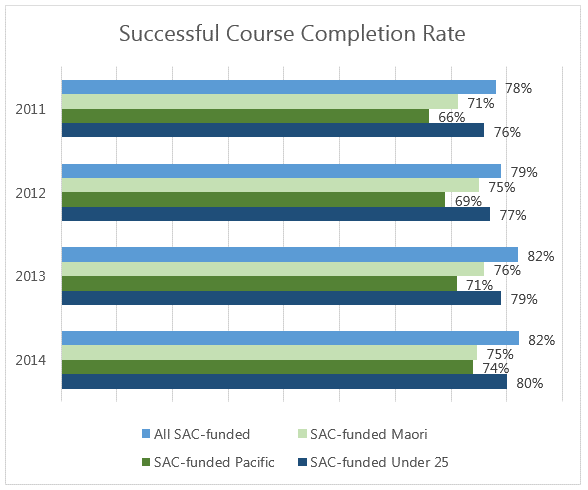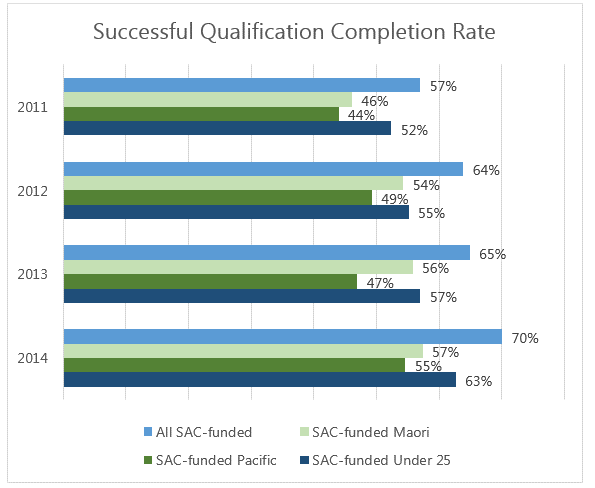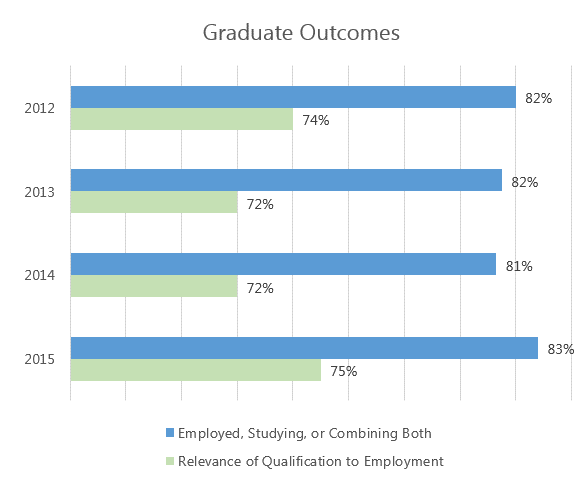Unitec is the largest provider of vocational and applied training in New Zealand. We understand the importance of the service we offer to our students and the wider community and recognise that students need to be confident in the education that they will receive from Unitec, in order to make the commitment to study here.
The introduction of the Government's Tertiary Performance Indicators in 2010 offers stakeholders a snapshot of Unitec's performance. It provides students, the community and employers with a greater insight into how we are performing and the information they need to make the best choice.
The information below is based on domestic students funded through the TEC's Student Achievement Component (SAC) funding mechanism. Results for 2015 will be available in July 2016.
Unitec has been awarded a confident rating by NZQA for our educational performance and our capability in self-assessment. View our full EER report.
Successful course completion rates
This is the foundation on which student success is built. The successful completion of courses indicator shows that students are undertaking courses that are at the right level, are able to develop during the courses and are leaving the courses with the skills they require. If the completion rate is too high or too low it can indicate that students are entering qualifications at the wrong level or courses are not challenging enough. This measure is particularly important at Unitec given the number of part-time and in work students who study with us. These students often choose to complete qualifications over a number of years or undertake courses to develop specific skills they need in their career.
Successful course completion rates improved for all students, including Maori, Pacific, and students aged under 25 years in the period 2011-2014. In 2014, Unitec rates of successful course completion for all SAC- funded students closely matched the ITP sector median rates across all programme levels.
- From 2011 to 2014 successful course completion rates increased from 78% to 82% for all SAC-funded students.
- From 2011 to 2014 successful course completion rates increased from 76% to 80% for SAC-funded students aged 25 and under.
- From 2011 to 2014 successful course completion rates increased from 71% to 74% for SAC-funded Māori students and improved from 66% to 74% for SAC-funded Pacific students.

Successful qualification completion rates
The large number of part-time students we have at Unitec means that some of our students undertake qualifications over a number of years. We also have a number of students undertaking NZQA national qualifications or exit qualifications as they want to learn specific skills rather than get a certain qualification.
The way this measure is calculated means that institutions with a growing student population or who offer a high proportion of multiple year programmes, such as Unitec, may show a reduction in the percentage of students completing qualifications even though the actual number has stayed consistent or may even have increased. We are also constantly working to improve our internal reporting processes, which will improve the accuracy of this measure over time.
From 2011 to 2014, successful qualification completion rates improved markedly for all students including Māori, Pacific, and students aged under 25 years.
- From 2011 to 2014 qualification completion rates increased from 57% to 70% for all SAC-funded students.
- From 2011 to 2014 qualification completion rates increased from 52% to 63% for SAC-funded students aged 25 and under.
- Qualification completion rates for SAC-funded Māori and Pacific students have increased by 11% over four years.

Graduate outcomes
Employment outcomes for Unitec graduates are an important indicator of the relevance of our qualifications and the quality of our graduates. Our 2015 Graduate Survey told us that 83% of respondents were in paid work, studying or both working and studying when surveyed.
Unitec is currently maintaining a steady position on relevance of qualification to graduate employment. In 2015, almost three quarters of our employed graduates transitioned into a job relevant to their area of study.
